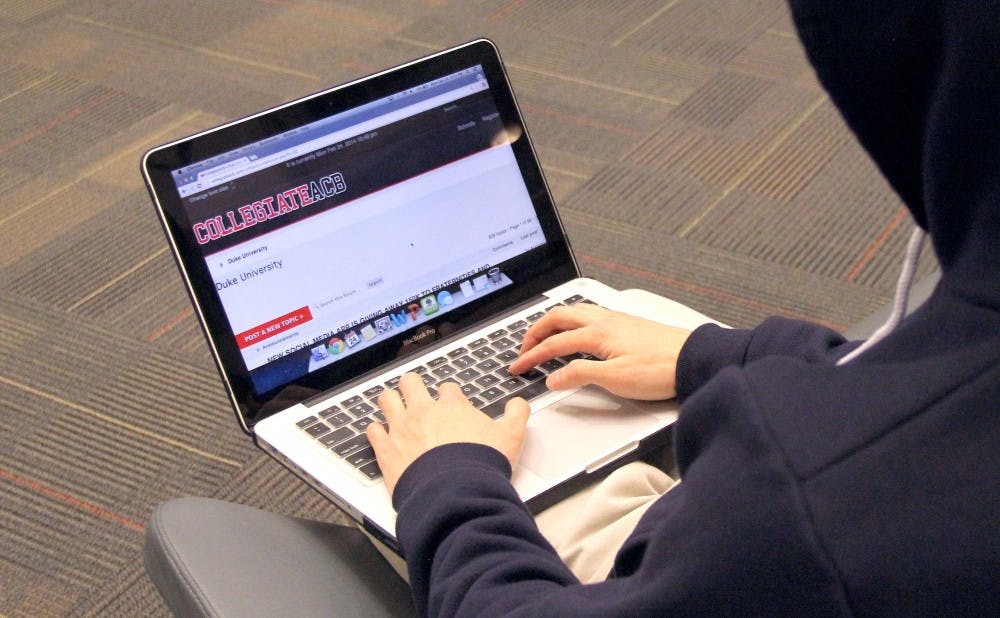Greater attention has been given to cyber harassment following The Chronicle's Feb. 14 profile on Lauren, the freshman adult film actress.
In the media storm that has followed The Chronicle's profile, activity on the Duke portion of online forum CollegiateACB has spiked. An unusually high number of posts have been made about Lauren in the past two weeks—including some with serious threats and personal information about her and her family. Current participation on Duke's CollegiateACB forum is relatively high, with more than 900 threads and more than 7,000 comments, making it the school with the second most active forum on the website.
Vice President for Student Affairs Larry Moneta expressed disdain for the forum, but noted that Duke has no control over websites like CollegiateACB.
“Most content on such sites, however vile, is protected speech and the owners of such sites could care less about institutional interests,” Moneta wrote in an email Thursday. “Further, most attempts to intervene just add to the publicity such site owners seek giving undesirable posts even more attention and visibility.”
Although the University cannot control these websites, Moneta advised students to seek out help if they feel threatened.
“While sites like this feature an abundance of hateful and disgusting posts, most are simply offensive and ill-willed,” he said. “But, vigilance is always called for and I advise any student who feels threatened in any way to inform Duke Police so that proper consideration can be given to all threats.”
Chief of Police John Dailey noted that the Duke University Police Department only receives a few complaints of cyber stalking each year.
"Under North Carolina law, [cyber stalking] includes repeated electronic mail that is annoying, threatening, or harassing," Dailey wrote in an email Sunday.
Stephanie Helms-Pickett, director of the Women’s Center, also advised students who had experienced cyberbullying to seek help. Helms-Pickett recommended students visit the Women’s Center or the Office of Institutional Equity for aid.
“Harassment of any individuals for any reason is not acceptable at Duke University and interferes with a student's ability to learn, study, work or participate in school activities,” Helms-Pickett wrote in an email Friday.
A CollegiateACB representative who did not identify himself/herself denied allegations that the forum encouraged virulent and unaccountable posting.
“The content on the site is a result of the users,” wrote a CollegiateACB administrator in an email Thursday. “When topics get out of hand and we are notified, we react accordingly.”
CollegiateACB tracks IP addresses, the CollegiateACB representative said. A user from the College of William and Mary was arrested and expelled from the school last year for posts he had made.
Duke has been included in other online forums of this nature since 2007 when Duke alum Matt Ivester—Trinity '05—founded JuicyCampus.com, a predecessor of CollegiateACB and the first major anonymous college gossip website. After JuicyCampus shut down in 2009, two graduate students from Johns Hopkins University and Wesleyan University created CollegeACB—an earlier version of the current CollegiateACB. CollegeACB garnered much attention at Duke, prompting the Panhellenic Association to petition for the University to ban it from campus.
Young women are more likely to experience cyberbullying than young men. According to a 2007 Pew Research Internet Project article, 38 percent of girls reported having experienced online bullying versus only 26 percent of boys.
More than 70 percent of the people targeted online are women, said Danielle Citron, Lois K. Macht Research professor of law at the University of Maryland and author of Hate Crimes in Cyberspace.
Citron attributed the high number of inappropriate or threatening posts on the Internet to a lack of accountability and host sites’ immunity to lawsuits.
“Sites can easily say ‘sue me,’ knowing that folks can’t afford to sue,” Citron said. “It’s like drive-by shooting.”
The fine line between protected and illegal speech resides on how often the speech is repeated and whether the speech is a statement of fact, said Justin Patchin, co-director of the Cyberbullying Research Center. A statement of fact is a statement that declares a proven and accepted truth.
“If they say ‘you’re a whore’—that’s defamation,” Patchin said. “If they say ‘you’re a douchebag’—that’s different. That’s not a statement of fact.”
Although certain speech may not be defamatory, repetition of irritating or disruptive speech can constitute cyberstalking, Patchin said.
“If I say that you’re stupid, that’s protected by free speech,” Patchin said. “If I say it multiple times in the middle of the night, and I call you up, and I say it over and over again—that’s cyberstalking.”
Even if offenders cannot be tried criminally for cyber harassment, victims have the option of suing the offender in a civil court, Patchin said.
Law enforcement is frequently reluctant or does not have the experience to pursue cyber harassment cases, Citron noted.
“The societal response is ‘Get over yourself, there’s nothing we can do’,” Citron said. “We used to just tell women, ‘Oh, you can leave your spouse—you can leave the house.’ It leads to under-enforcement of the law.”
The best way to combat cyberbullying at universities, Patchin said, is for those on campus to take a stand against it.
“I think it’s everybody’s responsibility to do something about these kind of incidents, including the administration and the students at Duke,” Patchin said. “Students should stand up and say—this is where the line is, and we don’t tolerate anything beyond it.”
Get The Chronicle straight to your inbox
Signup for our weekly newsletter. Cancel at any time.

